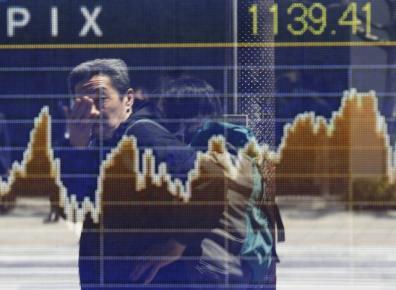Asia shares step cautiously around tame China inflation
Bareksa • 09 May 2014

A man is reflected on a screen displaying a graph showing movements of the Tokyo Stock Exchange - (Reuters/Issei Kato)
In contrast to Mario Draghi, Janet Yellen provided very little clarity on monetary policy this week
Bareksa.com - Asian shares were mostly down on Friday as a tense situation in Ukraine made investors cautious, though markets took a tame Chinese inflation report in their stride despite the implications for weakening demand in the region's economic powerhouse.
The euro remained on a shaky footing after tumbling overnight when European Central Bank President Mario Draghi said the central bank might act to stem slowing inflation and boost the euro zone economy.
Financial spreadbetters expected Britain's FTSE 100 to open as much as 0.2 percent lower, Germany's DAX 0.4 percent, and France's CAC 40 0.5 percent.
"When trading starts this morning European equities look set to reverse some of the gains made in the previous session," said William Nicholls, a dealer at London Capital Group, in a note to clients, after Draghi "strengthened stocks but put a banana skin underneath the heels of the euro."
An outlook upgrade by Standard & Poor's on Portugal to stable from negative could help sentiment. The move was expected by some analysts and came after Portugal on Sunday declared it would exit its three-year 78-billion-euro bailout this month without a precautionary credit line.
MSCI's broadest index of Asia-Pacific shares outside Japan was down 0.1 percent, on track for a slight weekly loss, but off session lows after data showed China's inflation in April was broadly in line with expectations.
Chinese consumer prices rose 1.8 percent in April from a year earlier while producer prices fell 2.0 percent. While the figures were in line with forecasts, it was still the slowest rise for consumer prices in 18 months as producer deflation persisted, underscoring sluggish demand.
"In the short term, unless we see some new stimulus or economic policy, I don't think there will be much flexibility for strong market performance," said Du Changchun, an analyst at Northeastern Securities in Shanghai.
The Shanghai Composite Index shed 0.3 percent, poised to fall 0.8 percent on the week.
Japan's Nikkei stock average erased earlier losses and ended up 0.3 percent, though it still posted a weekly loss of 1.8 percent.
Dollar index edges up
Markets also kept a wary eye on the Ukraine crisis. Pro-Moscow separatists in eastern Ukraine ignored Russian President Vladimir Putin's call to postpone a referendum on self-rule, declaring they would go ahead on Sunday with a vote that some fear could lead to war.
U.S. stocks mostly fell on Thursday with the Nasdaq Composite ending lower for a third straight session, its longest losing streak since early April. But European shares climbed 1.1 percent after Draghi raised the prospect of ECB action.
The euro came off a 2-1/2-year high against the dollar on Draghi's comments. It was last at $1.3839, marginally lower on the day, and well off Thursday's high of $1.3992, its loftiest peak since November 2011.
As Draghi's dovish comments pushed the euro down 0.4 percent on Thursday against its U.S. counterpart, U.S. Federal Reserve Chair Janet Yellen did the dollar no favours.
Yellen said in testimony to a Senate panel on Thursday that the Fed is in no rush to decide the appropriate size of its balance sheet, but if it ultimately shrinks it to a pre-crisis size, the process could take the better part of a decade.
"In contrast to Mario Draghi, Janet Yellen provided very little clarity on monetary policy this week, keeping the downtrend in yields intact," Kathy Lien, managing director of FX strategy at BK Asset Management, wrote in a note to clients.
The 10-year U.S. Treasury yield was at 2.608 percent, not far from its U.S. close of 2.602 percent on Thursday.
The U.S. dollar index, which tracks the greenback against a basket of six major currencies, added 0.1 percent to 79.449. Against the yen, the dollar rose about 0.1 percent to 101.71 yen.
In commodities trading, U.S. crude futures were up about 0.2 percent at $100.42 a barrel, on track to halt a two-week slide, while Brent crude added about 0.1 percent to $108.13, as traders continued to watch the situation in Ukraine.
Spot gold was slightly lower at $1,290.60 an ounce, down 0.7 percent for the week, its second straight weekly decline.
"Right now, the Ukraine situation is supportive of prices but data coming from the U.S. continues to be strong and that could keep investors away and weigh on prices," said Ronald Leung, chief dealer at Lee Cheong Gold Dealers in Hong Kong (Source : Reuters)